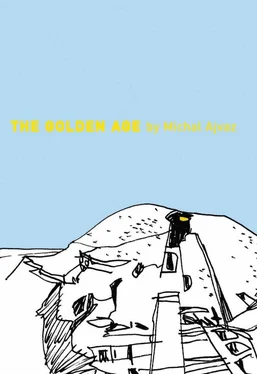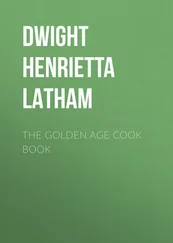Michal Ajvaz - The Golden Age
Здесь есть возможность читать онлайн «Michal Ajvaz - The Golden Age» весь текст электронной книги совершенно бесплатно (целиком полную версию без сокращений). В некоторых случаях можно слушать аудио, скачать через торрент в формате fb2 и присутствует краткое содержание. Год выпуска: 2010, Издательство: Dalkey Archive Press, Жанр: Современная проза, на английском языке. Описание произведения, (предисловие) а так же отзывы посетителей доступны на портале библиотеки ЛибКат.
- Название:The Golden Age
- Автор:
- Издательство:Dalkey Archive Press
- Жанр:
- Год:2010
- ISBN:нет данных
- Рейтинг книги:4 / 5. Голосов: 1
-
Избранное:Добавить в избранное
- Отзывы:
-
Ваша оценка:
- 80
- 1
- 2
- 3
- 4
- 5
The Golden Age: краткое содержание, описание и аннотация
Предлагаем к чтению аннотацию, описание, краткое содержание или предисловие (зависит от того, что написал сам автор книги «The Golden Age»). Если вы не нашли необходимую информацию о книге — напишите в комментариях, мы постараемся отыскать её.
is Michal Ajvaz’s greatest and most ambitious work.
The Golden Age
The Golden Age — читать онлайн бесплатно полную книгу (весь текст) целиком
Ниже представлен текст книги, разбитый по страницам. Система сохранения места последней прочитанной страницы, позволяет с удобством читать онлайн бесплатно книгу «The Golden Age», без необходимости каждый раз заново искать на чём Вы остановились. Поставьте закладку, и сможете в любой момент перейти на страницу, на которой закончили чтение.
Интервал:
Закладка:
And because speech was of the same matter as the other sounds of the island, the meanings carried by words were merely an appeal issued by the material of sounds. Speech was a dream of noises, and from these noises it did not move very far. The islanders knew that the murmurs were really composed of hundreds, perhaps thousands of utterances made simultaneously, that they were generated by the unfolding of an infinite number of stories all told at the same time. They were aware that a murmur was a wise, blissful richness which held words in contempt and shut itself off from them, but they felt, too, that every murmur contained an urgent longing for the liberation of at least one of the story-lines of its blend, that the thread of one plot at least should be unravelled from its fabric. This is why the islanders listened in silence to the sounds of the island, and this is why they spoke.
Another consequence of this homogeneity of speech and sounds of the island was that there existed on the island no sound which did not communicate something in some way akin to speech. The sounds of the island were germs of speech or traces left by it, reverberations of words which were not only the decline and disappearance of meaning but also its liberation and cleansing, as it is when in a broken, decaying, no-longer-usable thing a hidden scent is aroused that expresses the truth of that thing’s existence. For this reason there was no silence on the island. After some time, I, too, learned to perceive that which I had taken for silence as an open country of subtle sounds, as speech, as the whisperings of a faceless god.
And for this reason it seemed to me that conversations on the island had no beginning and no end, and that they contained no pauses. A dialogue was the continuation of noises and murmurs, weaving its somewhat darker thread into their fabric; and moments when the communication desisted were just moments when this thread was lost without any split or break appearing in the tissue. Even at those moments when the quietest sounds were subsiding, I felt that the fabric was continuing to unravel; now it was completely white, although it was still of the same smooth, unbroken material. For a time the words dissolved into the murmur, giving up their meanings to it and satiating it by them, perishing blissfully in the murmur and allowing their silent current to crystallize into new words. The islanders did not speak to fill the silence, as they knew no silence; they spoke because in the river of rustles they discovered the germs of words, utterances and images, because in the sounds around them they discovered the thoughts most inherent to them — thoughts which before then they had not known.
But I never thought that the islanders had discovered some kind of paradisiacal state of language. They were so afraid of losing the live source of thought that they never removed themselves very far from it; the vaults of their thoughts were not characterized by courage, the desperation of blind fumbling and the anguish of work; they resounded with sounds from the depths and shone with the lustre of life, but even so I could not help holding them a little in contempt. It is necessary first to lose the music of beginnings before it can return as a dreamlike echo in the architecture of thought. Although the language of the islanders was beautiful, it was a beauty which made weary.
The silence that was lost on the island never returned to me, even after I returned north. The ability to perceive an unbroken, endless fabric of sound stayed with me and became both a source of torment and a well that nurtured a strange happiness. During the day there are so many images woven into the fabric that absorb my attention, that I am hardly aware of the feel of its material; but at night when I am unable to sleep I feel it pass over my face, over my whole body in a slow, gliding movement. Just for a moment I would like to extricate myself from it, to enter the space beyond it, a space unknown to me; I have a desperate longing for silence. But in the material there is no opening, no chink, and now at night there are no pictures against it that might draw my attention away from the fabric; all there is here is a scattering of small, featureless and vague shapes that remind me of the patterns on the duvet cover. At night I appreciate how everything mutters and whispers, how the things of the world rustle, giving sound to the flow of time; I appreciate that all sounds, of the day and of the night, bear the same monotonous, nonsensical message.
But sometimes the disagreeable sense that I am unable to tear through the fabric of sounds in which I am wrapped like a mummy, is transformed to delight; then it seems to me that the murmur of being is the most beautiful music one could ever hear and I feel joy and gratitude that it is given to me to listen to such a concert. Of course, what I hear is no longer the beautiful sounds of the island, the call of the waves and the babbling of springs falling from rocks; now in the dark I hear the sounds of the rain, the trams and cars in the distance, the roar of an aeroplane, and also the sounds of my building at night, its wheezes and groans. But another thing I learned on the island was that the character of sounds is not so important: all sounds are parts of a single musical composition.
The panopticon of grammar
The language of the islanders overflowed with an unbelievable quantity of prefixes and suffixes and these encased the roots of words front and back, denoting peculiar features of reality which to begin with I completely failed to grasp, or at least I did not understand why such trivialities were considered important enough to merit their own forms in the language. For example, there was a suffix which described how the thing indicated by the root of a word gave off a heavy scent of decay; a further suffix could be stuck onto this to make it clear that although the surface of a thing was now taut, it would soon begin to slacken; and a prefix might be attached to the front of a root form to communicate that the thing was submerged in shadow, and that this shadow was of either a mauve or a greenish colour.
In this way, the root of a word was smothered by prefixes and suffixes so that it gave the appearance of a mere appendage, while the thing itself disappeared beneath all the designations and determinations, all the shadows, lights, vibrations and rhythms, odours and degrees of tension and laxity communicated by the prefixes and suffixes. The prefixes and suffixes that came together in a particular word carried so much determination that it might seem that this in itself was enough for the designation of a thing and that the root of the word was no longer necessary. The determination indicated by the root of the word presented itself as a feature at once inessential and dispensable; and it was true that one’s failure in conversation to catch the root of a word was of no great consequence. (The roots of words were about as important for the island’s lexicon as the king was for its political organization.)
I believe that the language of the islanders was in a phase of transition, that it was heading towards a state where the roots of its words would disappear altogether and words would be formed only from clusters of prefixes and suffixes that would collide in the middle of words, although perhaps a hyphen or a weak vowel would serve as a kind of memorial to the now-extinct root. I do not think, however, that this tendency to eradicate its roots reigned over the history of the island’s language as a whole. Not only things themselves were subject to constant change on the island, but the manner of these changes was also constantly evolving. It is quite likely that once their language has reached the stage at which words are formed of nothing more than clusters of prefixes and suffixes, other longings and dreams will be awakened within the islanders, and perhaps the long-changing edifice of prefixes and suffixes will collapse, to be replaced by short, concise words to which it will be impossible to attach any prefix or suffix, as anything these could possibly indicate will already be contained in the words.
Читать дальшеИнтервал:
Закладка:
Похожие книги на «The Golden Age»
Представляем Вашему вниманию похожие книги на «The Golden Age» списком для выбора. Мы отобрали схожую по названию и смыслу литературу в надежде предоставить читателям больше вариантов отыскать новые, интересные, ещё непрочитанные произведения.
Обсуждение, отзывы о книге «The Golden Age» и просто собственные мнения читателей. Оставьте ваши комментарии, напишите, что Вы думаете о произведении, его смысле или главных героях. Укажите что конкретно понравилось, а что нет, и почему Вы так считаете.












